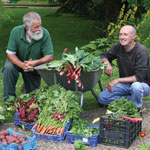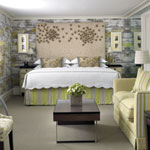Responsible hospitality – how to offer luxury without the guilt
Sustainable luxury is not an oxymoron. It can be found throughout some of the UK's leading hotels, but today it is more about the basics than the bling. Emily Manson reports on a new, carefully considered approach to business
A decade ago, high rise icons like the Burj al Arab were being built as nations reaped the rewards of the boom years. But that's all over now. Overt luxury - or at least the perception of it - has become mildly distasteful, a reminder of the bankers' excesses and the world's ills.
At the same time the environmental awakening has been persistently growing, finally gaining critical mass, and these combined factors are changing the way luxury is perceived - and delivered - in hotels throughout the world.
John Firrell, director of the Considerate Hoteliers Association (CHA), admits that luxury brands came a little late to the sustainability party as luxury was historically about offering the best or most of this or that. "Now, in this straitened world, they don't want to be seen to be wasteful. It's not good PR," he says.
Sustainability champion Raymond Blanc, who was named the winner of the inaugural Good Egg Award for 2009/10 by the CHA, goes further, adding: "Luxury cannot be like it used to be. Our wasteful excesses have brought us to this financial crisis, fishing crisis and environmental crisis. The modern consumer is more responsible, critical and demanding. He wants to know where the food comes from and what is in it. Integrity, as much as authenticity, will be the core value of luxury tomorrow."
Mark Linehan, managing director of the Sustainable Restaurant Association, agrees: "Gone are the decadent days of big spending with no regard for the consequences. Luxury to some meant excess or ostentation, but it's now becoming accepted that ‘luxury' can also apply to sustainable products."
Where food comes from, how operations manage their resources, treat their staff and customers, are all now important considerations for consumers when choosing their travel and dining destinations, explains Linehan.
Travel's Changing Demographic
Evolving consumer demographics are driving changes in the type of luxury that is demanded. While the baby boomer generation, which likes the comfort of branded hotels, still remain the biggest luxury travellers, they are getting older and soon won't travel as much or will look for ‘safer' travel choices like cruises.
Angela Clarke, founder of ethical hospitality consultancy Lumiere Associates, predicts: "In 20 years the majority of travellers will have grown up on organic and Fairtrade mantras and will be looking for a different un-branded experience."
A desire for unspoilt, different travel experiences will then become the dominant demand, with consumers looking for simpler, independent, sustainable types of luxury. Indeed there are a growing number of customers already out there looking for this.
Satisfying Demand
So how can operators satisfy these demands? "It's not more difficult or even that much more expensive in many cases for luxury to be sustainable but it has to come from the top down, as it has to be about procurement," advises Clarke.
There are non-toxic paints, natural alternatives to carpeting, low-energy lighting, local wood sources, non chemical-based amenities, hemp robes and non-toxic pesticides for gardens which are all sustainable, readily available on the market and can be used to create luxury.
"Everything has moved ahead so much now, it's just about spending the time on sourcing," says Clarke.
But it's very important that sustainable luxury is not just seen as having to give something up, like driving a car. "It's just doing things in a different way," says Claire Beard, group sustainability manager of the Scarlet hotel in Mawgan Porth, Cornwall.
The proliferation of innovative luxury concepts that has arisen lately is testament to this: from glamping and private island retreats to luxury safaris and treehouses, there are few back-to-basic hospitality concepts that haven't been given the ethical luxury makeover.
Beard explains that for sustainability to become embedded throughout any luxury business, the concept has to be about the ethics behind the concept and the products within it.
"It's not about sacrificing anything but finding that right solution for your operation. Finding luxurious and sustainable solutions or products does take more time and research," she admits, warning: "If the ethics don't go to the core, then initiatives are more likely to be token gestures and greenwashing."
And, of course, increasingly savvy customers will pick up on this, so in the end, it will only be the luxury concepts that truly embrace sustainability that will reap the benefits, in terms of customer appreciation and loyalty.
Some areas of luxury hotels and resorts are naturally more resource intensive and will always be harder to make sustainable. Danny Pecorelli, managing director of Exclusive Hotels, which owns four luxury country house hotels, admits that spas are harder to make sustainable than food and beverage or conferencing because there is an inherent conflict.
"To be really green means not having a spa in the first place, and there is always a slight element of falsely claiming ‘greenness', so there has to be some integrity in what you're claiming and trying to achieve," he says.
Within the spa framework, you can only do what you can do, he advises, but even this scope is increasing fast. The challenges of air-conditioning, pools, spa and golf courses can be mitigated with hybrid glass, specialist lighting, de-salinated pools, seawater watering systems and more. Exclusive Hotels' 50,000 used spa slippers are recycled as sofa stuffing by Tidy Planet to reduce wastage.
Practical encouragement
Sustainable luxury is, for many, still at the start of the developmental curve, but it's clear that consumers are expecting increasing levels of environmental responsibility at the top end of the market and that what constitutes that market may well be found as much in a tent in Cornwall as a branded five-star hotel.
Firrell says: "Increasingly the excellent hotelier is also a responsible hotelier, and in time the two will become synonymous."
Blanc agrees, adding: "At the end it makes good business sense as more and more social and environmental stresses keep piling on. The rules are changing and while luxury has been the last to change, in tomorrow's world they will go together and enhance each other."
As one of the pioneers in the sustainable luxury field, Le Manoir aux Quat'Saisons has taken steps to introduce a plethora of initiatives which have resulted in a significant reduction in water and energy usage, and a big increase in recycling activities and use of seasonal and sustainable foods. It was one of the first hotels to replace plastic with cotton bags and remove chemicals from shampoos.
Water reduction
A borehole, sunk to 71m below ground level, has been dug at a cost of £100,000, and is used to irrigate the 27 acres of grounds and gardens, as well as provide all water used for cooking and washing.
Plans for a bottling facility are being explored, which will enable Le Manoir branded water to be served at the table.
"In two or three years, the borehole will have paid for itself, and there will be fewer carbon emissions, increased profitability and an enhancement of the brand," says Blanc.
Other savings are made by the recycling of bottled water left by guests in the bedrooms, to be used for watering indoor plants; the installation of dual flush toilets every time a bathroom is refurbished; and the introduction of electronic and push taps in the staff areas.
Energy savings
While timer and light sensor switches have been included throughout Le Manoir, rooms are kept at 18°C until an hour before the guest arrives, when the heating will be increased to ‘ambient'. Only one light is left on when turning down a guest room, rather than leaving all the lights blaring, explains Blanc.
Straw logs - a farming by-product from Warwickshire, from www.strawfuels.com - are used on the open fires. They are an environmentally friendly alternative to wood logs and have a one-year renewable CO2 re-absorption cycle.
Improved recycling
The hotel has worked hard to reduce its level of waste since 2009 when it produced 400 tonnes of rubbish - equating to £26,000 labour costs (internal collection, transport, management of waste stream and administration) and £3,000 fuel and machinery costs.
Since 2010, 42% of Le Manoir's waste has been recycled , made up of 12% cardboard, 10% glass, 8% plastic/office paper, 8% composting back into the garden and 4% animal by-products.
A new initiative to recycle bars of soap in the guest bathrooms by encouraging guests to take them home with them resulted in 556.25kg of soap being removed from the hotel's waste in one month. Out of 551 rooms sold in December 2012, 445 took away the soap. And cardboard folders - in which the bills were presented to guests - fell from 24,000 in 2010 to 15,500 in 2011, with 10p being donated to Eco-Brigade and 10p to the Woodland Trust for each guest who did not take a bill folder.
Seasonal and sustainable food
Le Manoir has reduced its carbon footprint by increasing the amount of local food it uses from 10% a decade ago to the 50% it uses today, much of which is grown in the hotel's extensive kitchen gardens. To further increase this ratio, Blanc has also spent the past seven years creating an orchard of 1,000 old British varietals.
"The orchard has been a huge commitment, but it will help us bring back what has been lost," he says.
Ken Hunt, who owns Combe House hotel with his wife Ruth, doesn't like the word luxury, because it's synonymous with prolific waste. Combe House is "top end but tries to avoid excess" he explains.
The kitchen uses mainly fresh food and has minimised its freezer and fridge usage, saving energy and improving the food product simultaneously. "We are very conscious of bringing food in and using it straight away," says Hunt.
The hotel doesn't have standard hospitality trays in the rooms, but if guests request them, the kettles are just big enough for two cups so they don't waste water or energy.
The size of the towels has been reduced, "They're still luxurious but a little smaller," says Hunt, while the staff and hotel is "generous of spirit with other things".
Flowers grown in the grounds and the internal space gives guests a sense of luxurious grandeur while the friendly service, conversation and advice available and given by the staff mean that customers feel special from the moment they arrive at the car park. "Internal communication among the staff about guests is also key and there's a total focus on guests' needs, backed up by copious and meticulous guest notes," explains Hunt.
The refurbishment of the Linen Suite within the original Victorian laundry was a challenge because of the Grade-I listed status of the building. Lime water and lime wash were used for the walls, along with wooden floorboards, cotton and wool fabrics - all of which are luxurious, yet sustainable. Penhaligans are the chosen plush toiletries, which are more eco-friendly than some other products. Rain water is captured from the roof for the 6ft diameter copper bath, while the huge windows, which can't be double-glazed, have thick wool curtains and wooden shutters to keep in the warmth and add to the luxurious ambience.
Firmdale Hotel Group owns eight hotels in London and New York, and its philosophy is about passion. Every product given to a guest provides a ‘wow' factor, which incorporates the environment.
Laundry bags are made from embroidered linen; coat hangers are luxuriously padded, reclaimed Norwegian wood; and bed linen is 100% cotton from an ethical supplier. Every supplier is checked out personally.
The group has removed cardboard boxes for soap, shower caps and other bathroom products, replacing them with wrappings that are sustainable and durable, so if a guest happens to splash water on them, they're not ruined, preventing unnecessary wastage. The dental kit now comes in a PVC case, the razor kit is packaged in a canvas bag and even has a removable head. All are designed for the guest to keep and reuse.
"The idea is that people can take these items home and keep our passion with them." says group purchasing manager Jessica Black, adding: "There's a lot of care and thought goes into everything we buy. Green is not the cheapest route but we choose it because we feel it's the right route. It's all about passion."
With the group's newer properties, like Ham Yard, which is currently being developed in London's Soho with an opening planned for 2013, sustainability is built in from the ground up. Everything is done to the highest possible specifications and sustainability is at the crux of all decision making. Even being in New York hasn't prevented the group from introducing a sustainable rooftop kitchen garden at its Crosby Street hotel as well as other public garden spaces in the heart of Manhattan to sustainably enhance the guest experience.
sustainable luxury overseas
Tim Starley-Grainger, eco-editor for EcoLuxHotels.com, highlights the following hotels outside the UK as providing inspiration when it comes to sustainable luxury:
â- The Inn at Weathersfield in Vermont, USA, has thoroughly modernised its older building, insulating floors and walls, replacing doors and windows and updating heating, cooling and lighting to achieve a 50% saving over five years.
â- Nikoi Island in Indonesia has set up its own foundation working with local villages to understand the perils of overfishing, the value of marine reserves and the opportunity of tourism.
â- The Hoshinoya Karuizawa in Japan set up an award-winning conservation project which helps manage interaction between local black bears and the human population.
â- The Southern Ocean Lodge on Kangaroo Island in Australia offers behind-the-scenes tours and posts water and energy consumption rates behind the bar.
â- Inn by the Sea in Maine, USA, has created beautiful gardens designed to encourage butterflies.
â- Movenpick Dead Sea in Jordan has created a sustainable garden that can cope with the increasingly dry climate.
Sustainability is a movement that is now irreversible - it connects with good business. Embracing good ethics now will enhance your business for the future. When it comes to being sustainable within the luxury sector, it should encompass everything from a beautiful apple - grown in good soil with the minimum use of chemicals - to a three-star Michelin meal, produced from the purest ingredients.
Raymond Blanc
Responsible hospitality resource
For more information on how to run your business responsibly, visit our online resource www.catererandhotelkeeper.com/responsible-hospitality. The Responsible Hospitality channel, supported by Accor, Gram UK - and Kraft Foods, features tools and guidance that will help you reduce waste and energy usage, while offering examples and information on increasing recycling, ethical food sourcing and social responsibility.
This week's issue of Caterer and Hotelkeeper, guest-edited by legendary chef Raymond Blanc, is on sale at newsagents. Call 020 7881 4829 for your nearest stockist, subscribe today or call 0845 077 7755.
E-mail your comments to Caterer News here.
Catererandhotelkeeper.com jobs
Looking for a new job? Find your next job here with Catererandhotelkeeper.com jobs
















